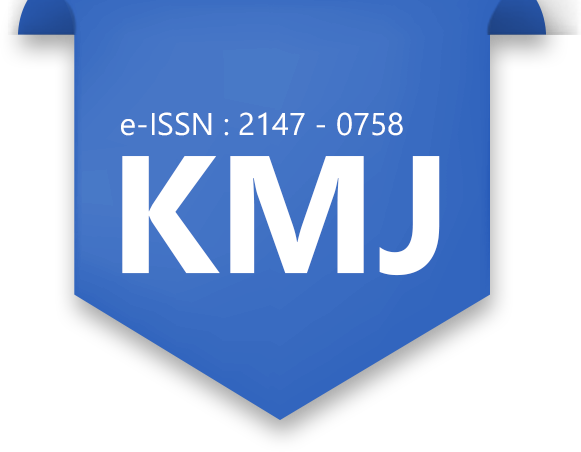
Editorial Policies
The editorial office checks the conformity of the manuscript with the journal’s general guidelines before sending it to Editor. Then, Editor or Section Editors assigned by Editor will send the reviewers. Any manuscripts not prepared in accordance with the journal’s guidelines will be returned for revision. The initial evaluation period usually takes 30 days. If revision is requested, authors should submit their revised manuscripts within 21 days. Manuscripts and revisions should be submitted through the online manuscript submission system at the website http://kocaelimj.org/jvi.aspx. Manuscripts sent by e-mail will not be accepted.
Manuscripts are evaluated in accordance with the principles of double-blinded peer review. Of the submitted manuscripts, those considered to be suitable are subjected to preliminary evaluation by the editorial office in terms of style, format, etc. and by the Editor in terms of their content. Manuscripts considered to be scientifically adequate are assigned to at least two reviewers. These reviewers are independent experts and members of the advisory board or who have published internationally on the topic of the manuscript. Research articles, systematic reviews and meta-analyses may be also evaluated by the Editor’s statistician counselors in addition to peer review. When needed, the manuscripts may be scanned by the editorial office for determination of plagiarism and non-ethical situations. Also, all manuscripts are reviewed and edited for compliance with the rules of English grammar. All contributing authors of a manuscript accepted for publication are deemed to have accepted the right of editors to make corrections provided that no fundamental change is made to the basic meaning of the original text. Manuscripts not accorded priority for publication by the Editor, Associate Editors and Referees are rejected.
The retraction requests of the manuscripts close to the final decision in evaluation process, without any reasonable explanation (not contrary to the Publication Ethics) is considered in the scope of rejection decision. Manuscripts that are not revised and resubmitted within the specified time and fail to notify the journal accordingly will be rejected.
Once a manuscript is accepted for publication, addition to the author list, removal from the author list and order change cannot be effected.
Manuscripts accepted for publication are prepared as ‘Epub ahead of print articles’ and published with an assigned DOI on the journal website http://kocaelimj.org/jvi.aspx.
Information on the latest status of manuscripts submitted for evaluation and other information about the journal are available on the website.
Authors are required to disclose any financial or non-financial interests that could be perceived as a potential conflict of interest related to their research. This includes but is not limited to funding sources, stock ownership, employment, consultancies, and personal relationships. Authors must be transparent about the role of any funding sources in the research process and the publication of results. This includes specifying whether the funder had any influence on the study design, data collection, analysis, or reporting. Any financial or non-financial support received during the research process should be appropriately acknowledged in the manuscript's acknowledgments section.
Reviewer and Editor Responsibilities:
Reviewers and editors involved in the peer-review process must declare any potential conflicts of interest that may affect their ability to provide an unbiased evaluation of the manuscript. If a reviewer or editor has a conflict of interest related to a submitted manuscript, they should promptly notify the editorial office and recuse themselves from the review process for that specific manuscript. Reviewers and editors should maintain strict confidentiality regarding the content of the manuscripts they evaluate, refraining from sharing information or seeking to exploit the work for personal or professional gain.
Authors submitting research involving human subjects must confirm that informed consent was obtained from all participants. This consent should be clear, voluntary, and informed, with participants fully understanding the nature of their involvement, potential risks, and benefits. Authors should provide evidence of ethical approval obtained from an institutional review board or ethics committee for studies involving human subjects. Authors should safeguard the privacy and confidentiality of human subjects. Personal information should be protected, and data should be anonymized when necessary. Special care should be taken when involving vulnerable populations, such as children or individuals with diminished autonomy. Additional safeguards may be required to protect their rights.
Authors conducting research involving animals should provide evidence of ethical approval from an institutional animal care and use committee. Authors should minimize harm to animals by using appropriate methods and techniques. The Three Rs principle (Replacement, Reduction, Refinement) should be applied to reduce the number of animals used and minimize their suffering. Authors should provide detailed descriptions of animal care and housing conditions, as well as the steps taken to alleviate any suffering or distress. Authors are encouraged to adhere to international guidelines, such as the Declaration of Helsinki for human research and the ARRIVE guidelines for animal research.
Authors submitting research involving human subjects to Kocaeli Medical Journal must provide clear evidence of obtaining informed consent from all participants. This includes ensuring that participants were provided with understandable information about the research and that their consent was freely given without coercion. Manuscripts submitted to Kocaeli Medical Journal undergo ethical review to verify that informed consent was obtained and that the research adheres to ethical guidelines and legal requirements. Special attention is given to research involving vulnerable populations, such as children or individuals with limited autonomy. In such cases, additional safeguards are required to protect their rights and well-being.














